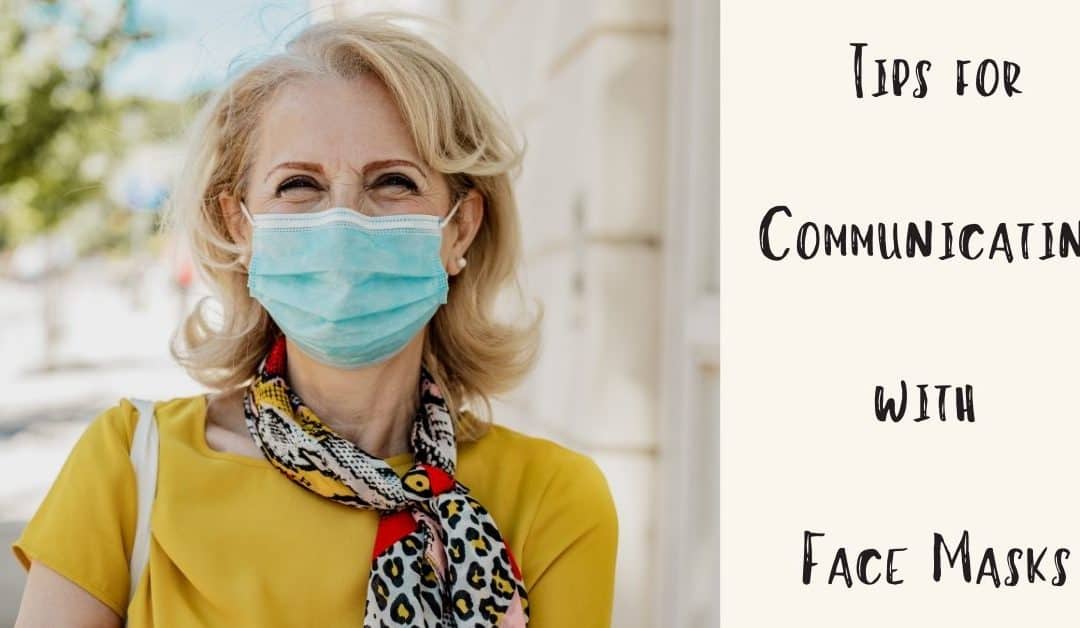Now months into a global pandemic, you have likely been wearing a face mask for some time. Health experts continue to advocate for wearing a face mask to help slow the spread of COVID-19. Though wearing a face mask and practicing social distancing are major ways you can protect your health during these times, these measures can also make communication more difficult.
This can be particularly challenging for people with hearing loss whose ability to hear and process sound is reduced. There are a few tips you can practice that can be useful for communicating with face masks!
Face Masks & Communication
Wearing a face mask is a vital way you can protect yourself and others from contracting COVID-19. Face masks serve as a barrier between your nose and mouth, and droplets that may contain bacteria like COVID-19. They also filter out large particles in the air and reduce the contact you have with them. Additionally, face masks also protect others from coming into contact with your saliva and respiratory secretions.
As masks continue to be critical for public health, it is also important to know that they can make it harder to communicate for people with impaired hearing. Face masks can completely block the transmission of certain high frequency sounds. Additionally, they can:
- Muffle or slur sounds, making it difficult to hear words and follow a conversation
- Cause discomfort with your hearing aid
- Paired with the social distancing rule of 6 feet, sound can be really unclear
Another significant way face masks impact communication is that they cover the lower half of a person’s face. People with hearing loss often use strategies of reading mouths and other facial cues to better understand what is being communicated. These nonverbal cues help a person identify words and provides context which enhances understanding. Face masks eliminate these strategies, further complicating communication.
Tips for Better Communication
Though face masks add a set of challenges, it is incredibly important to wear them and protect your health! Here are a few ways you can still communicate effectively:
- Eye contact: when starting a conversation, make sure you have the other person’s attention so they know you are speaking to them. Also, face each other so there is a clear view of body language.
- Reduce background noise: power off any sources of background noise: television, music, household appliances etc. Background noise can make it even more difficult to hear clearly and can distract from focusing on the conversation you are having. It also gives your brain more information to process which can be tiring. This also means that you should avoid having conversations in loud places.
- Project Voice: because face masks also mask sound and you are standing at a distance, it can be helpful to project your voice without shouting of course. Slowing your speech down a little can also be useful by giving the other person more time to process and ask for clarification if needed.
- Use nonverbal cues: to compensate for your mouth being covered, still engage others modes of body language: nodding your head, using hand gestures, raising eyebrows etc. to help communicate what you are saying and how you are feeling. We can sometimes forget how important nonverbal communication is!
- Check-in: regularly check-in with the person(s) you are talking to make sure everyone is understanding what is being communicated. This also invites the other person to ask if they need clarification or if they need you to make any specific adjustments.
- You can also summarize by using phrases like, “what I heard you say is…”.
- Also remember that rephrasing rather than repeating can be more helpful
- Directly ask what would be most helpful to their hearing
The most important tip is to be patient with yourself and with others. These are trying times that everyone is trying to navigate as best as they can. As health experts continue to emphasize the use of face masks, it is important to protect your health and practice the necessary safety precautions. This may also require you to make adjustments to your communication which can take a little time to get used to but is part of protecting your overall health!
Treating hearing loss with the use of hearing aids is an excellent way to improve your speech recognition abilities! If you believe you may have a hearing loss, contact us today to schedule a hearing test and get on the path to treatment.

